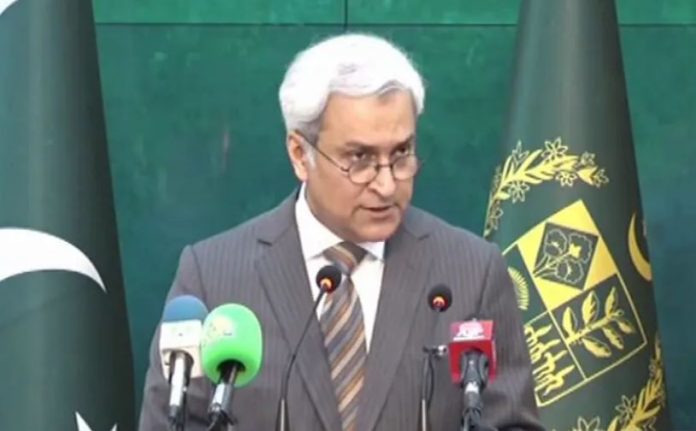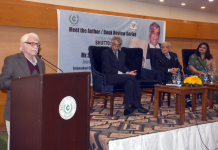ISLAMABAD, OCT 31: Foreign Office spokesperson Tahir Hussain Andrabi on Friday said that the Afghan Taliban government in Kabul had acknowledged the presence of the Tehreek-i-Taliban Pakistan (TTP) and other terrorist organisations in its territory.
The talks were scheduled as Pakistan and Afghanistan agreed to continue a ceasefire between the two countries and following a rapid deterioration of ties and a brief conflict along their shared border earlier this month.
The agreement capped five days of a second round of tense negotiations — with the first one held in Doha on October 18 and 19 — in Istanbul mediated by Turkiye and Qatar. The round, which had begun on Saturday, had reached a point of near-collapse on Wednesday, with Islamabad saying that its long-standing concern over terror attacks emanating from Afghanistan remained a major point of contention.
But a breakthrough in the stalemate came after Turkiye and Qatar salvaged the dialogue process for the second time in less than a week.
Fielding questions after delivering a weekly press briefing, the spokesperson said: “The Afghan Taliban government has acknowledged the presence of TTP and other terrorist organisations.
“Afghan authorities have given various justifications for not taking action against these organisations,” he added. “The presence of terrorist elements on Afghan soil reinforces Pakistan’s security concerns.”
In response to a question, Andrabi said that Pakistan has been in constant contact with the Afghan Taliban over the past four years, noting that Islamabad took a “cautiously optimistic” approach to negotiations with Kabul.
“[We are] not extremely optimistic, but maintaining optimism in diplomacy is a professional requirement,” he explained. “Optimism is an integral part of our diplomatic process.”
When asked about opening the Torkham border crossing — a major border crossing between the Pakistani city of Torkham and Afghanistan — the spokesperson said he had “no information on the matter” and referred the question to the interior ministry.
“Contact is being maintained with Pakistani residents, traders and businesspeople in Afghanistan,” he said. “Traders have the option to return through direct flights [and] work is underway to determine the number of people who wish to return.”
Andrabi noted that the border will remain closed until further notice.
During the briefing, he said that Pakistan hoped for a “positive outcome” of the next round of talks with the Afghan Taliban set to begin on November 6.
“Pakistan will continue to remain engaged in the mediation process and hopes for a positive outcome for the November 6 talks,” he said during a weekly FO briefing.
Andrabi recalled during the briefing that the second round of talks between Pakistan and the Afghan Taliban regime in the presence of mediators concluded in Istanbul yesterday evening.
“Pakistan participated in the Istanbul talks, which started on October 25, in a good spirit and with a positive intention,” he added.
The FO spokesperson said the talks were initially scheduled for two days.
“However, in an effort to reach an amicable agreement with the Taliban regime, the Pakistan side, in earnest, continued the talks for four days.
“Pakistan positively engaged with the Taliban regime without compromising on its clearly stated position that Afghanistan soil should not be used for terrorism against Pakistan.”
He asserted that Pakistan did not seek further escalation of hostilities but “expects the Afghan Taliban regime to honour its commitment to the international community and address Pakistan’s legitimate security concerns by taking concrete and verifiable actions against terrorist entities, including Fitna-al-Khawarij and Fitna-al-Hindustan”.
Fitna-al-Khawarij is a term designated by the state for the banned terror outfit Tehreek-i-Taliban Pakistan, and Fitna-al-Hindustan is a term that the state uses for Balochistan-based groups to highlight India’s alleged role in terrorism and destabilisation across Pakistan.
Andrabi said that Pakistan had been urging the Afghan Taliban for the past four years to take “decisive and effective measures” against terrorist outfits present on Afghanistan soil.
“We repeatedly shared credible information about the presence of top leadership of Fitna-al-Khawarij and Fitna-al-Hindustan on Afghan soil with the Taliban regime. However, despite repeated assurances in the past, there has been a surge in terrorist attacks in Pakistan from Afghanistan.”
He said the “consistent and total disregard” of Pakistan’s legitimate security concerns by the Afghan Taliban over the last four years and the “unprovoked aggression against Pakistan with the support of Fitna-al-Khawarij on Oct 11 and 12 and later Oct 14 and 15 led to violent exchanges across the international border”.
“Pakistan decisively responded to Afghan provocation aimed at destabilising the border area, facilitating terrorism, and furthering the Fitna-al-Khawarij’s nefarious designs”.
Pakistan would respond resolutely if provocations continue in the future, he further warned.
The FO spokesperson emphasised that Pakistan had always been desirous of a peaceful, stable and regionally integrated and prosperous Afghanistan, “which is at peace with itself and its neighbours”.
“With the Taliban takeover of Kabul in August 2021, we expected the vision of regional peace and connectivity to be realised.
“In the same spirit, despite our various security concerns, Pakistan took many initiatives this year to support and help Afghanistan and extended a number of concessions to Afghanistan, especially for Afghan transit trade”.
He further highlighted that Islamabad had elevated its diplomatic representation with Afghanistan from charge d’affaires to the ambassador level and also agreed to expand the China-Pakistan Economic Corridor project to Afghanistan.
Andrabi recalled that Deputy Prime Minister and Foreign Minister Ishaq Dar had visited Kabul thrice, including on July 17, to sign an agreement on the joint feasibility study of the Uzbekistan-Afghanistan-Pakistan Railway Project.
He further stated that the “government and armed forces stand ready to take all possible measures to protect Pakistan’s sovereignty and ensure the safety and security of its people”.
The FO spokesperson then went on to appreciate the “constructive role of brotherly countries of Qatar and Turkiye”.
“They have been making their best efforts for an amicable and peaceful resolution of the issue,” he said.
‘Ceasefire can’t be effective until terrorism stops’
Meanwhile, Defence Minister Khawaja Asif, who had been particularly directing strong criticism towards Afghanistan since the beginning of border hostilities earlier this month, also confirmed while speaking to Geo News that an interim agreement had been reached between the two countries with the mediation of Turkiye and Qatar.
“Another round of negotiations will be held on November 6,” he said.
Asif asserted that Pakistan’s main demand continued to be the “stopping of terrorism emanating from Afghan soil”.
He added that “there is a ray of hope, but not because of Afghanistan and only so because of Qatar and Turkiye’s influence” over Kabul.
The defence minister further said, “There have been some ceasefire violations from Afghanistan”, and also emphasised that “until terrorism stops, the ceasefire can not be effective.”
Border skirmishes and talks
Pakistan and Afghanistan saw a worsening of ties during recent weeks, which featured border skirmishes, counter-statements and allegations.
The hostilities began earlier this month when an attack was launched on Pakistan from Afghanistan on the night of October 11. The attack had followed an allegation from the Afghan Taliban of airstrikes by Pakistan into Afghanistan — an accusation which Islamabad has neither confirmed nor denied.
For its part, Islamabad has long demanded that the Taliban stop terror groups from using its soil against Pakistan. The Taliban, however, deny the allegation of allowing terrorists to operate from Afghan soil.
Meanwhile, Pakistan continues to grapple with the issue of terrorism and has suffered multiple casualties among security forces in intelligence-based operations.
After the initial skirmish on October 11, multiple others took place along the Pakistan-Afghanistan border. Meanwhile, strikes by Islamabad also targeted Gul Bahadur group camps in Afghanistan.
Eventually, the two sides came together for dialogue in Doha, which resulted in a temporary ceasefire, as well as a commitment to reconvene in Istanbul to work on mechanisms for lasting peace and stability between the two countries.
Last week, the second round of talks, which were being mediated by Türkiye and Qatar, between the two sides began in the Turkish capital.
But on Wednesday, Tarar announced in a post on X that the latest round of talks between Islamabad and Kabul in Istanbul “failed to bring about any workable solution”. He also asserted that Pakistan would continue to take all possible measures to protect its citizens from terrorism.
However, after Turkiye and Qatar’s efforts, the two sides to continue the ceasefire, set up a joint monitoring and verification mechanism to ensure peace along their shared border and penalise any violators.

















